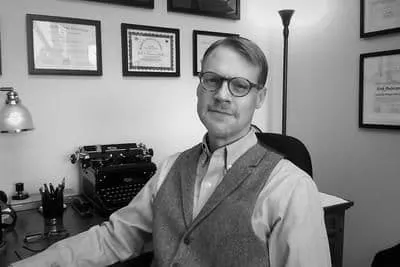
"Know thyself" - Greek Aphorism, Temple of Apollo at Delphi
My name is Erik Pedersen and I’m a psychologist in Morgan Hill, California. I was born and raised in the north bay. I come from a middle class family. My parents were mere kids themselves (25 and 21) when they had me. The environment I grew up in was not always warm and loving but it was my entry into this beautiful world and I am grateful to my parents who did their very best to raise me. I now make my home in Morgan Hill with my wife who is a successful writer and our fifteen- year-old son who is a successful tenth grader, musician, and budding environmental scientist.
My first career was teaching English in Czechoslovakia as a Peace Corps Volunteer and when I returned home I taught English literature in an American high school. While teaching Shakespeare to American teenagers, I found that the “troubled” kids were attracted to my classroom and I ended up serving them in a different capacity; as witness and interpreter to some of their inner and outer turmoil. I had also witnessed serious human suffering when I was living in Eastern Europe as a Peace Corps Volunteer and aiding a group of war refugees. This experience enabled me to see first hand what trauma does to human beings. After four years of teaching, talking with troubled teens, and pondering the human condition, I was called to forge a career in the humanities.
I was fortunate to be one of twelve students accepted to a rare graduate program that offered intensive training in psychotherapy. I trained for four years as a depth-oriented psychotherapist as well as having undergone intensive therapy myself. I was highly supervised by one of the best psychotherapists on the west coast and I feel extremely fortunate to have worked with him. His mentorship and training had a monumental impact on my vocational identity. Sadly, many graduate schools offer clinical training programs that focus on classification and diagnosis. While this is necessary, it is the study of how people make meaning and undergo transformational change that is the most useful. This was the kind of training I received.
After graduate school I began working as a psychologist at Kaiser Permanente in San Jose. I was later promoted to Chief of the Chemical Dependency Program and following that I moved into the position of Manager of Adult Psychiatry in Gilroy.
The Kaiser Permanente 'medical model' of psychiatric treatment focuses primarily on "symptom alleviation". However, to obtain deep and lasting transformational change, an expansive approach is required. This is the kind of psychotherapist I was trained to be and represents the change I seek to help clients make in their lives. To that end, recognizing the limits of a 'medical model' approach, I separated from Kaiser Permanente in 2016 to open my private practice.
In private practice it is my task to help clients manifest a sense of freedom within their own being. I cannot claim to help everyone. The outcome of psychotherapy is not guaranteed. I may make interpretations that you'll find challenging. Conflict and discussion are part of the healing process. But we will press forward until you experience the relief and resolution of your authentic self in the present moment. If I feel I cannot help you, I will tell you so directly and offer a referral to someone better suited to assist. I am pleased that the vast majority of clients I see report that they experienced significant changes in their self-perception and departed therapy feeling lighter and unburdened.
When I'm not in the role of psychotherapist, I enjoy acting goofy with my son, reading, playing the electric guitar (particularly blues and rock), staying up late at night talking about the meaning of life with my best friend / wife, and wondering how I became so fortunate in this joyful, painful, beautiful life.
Finally, I might add that I've been a student of Zen Buddhism and Eastern Philosophy for 30 years. This unique experience has afforded me some insight into the nature of the mind; its function and its dysfunction. I've come to understand that all humans can mistake emotional learnings as "real" constructs and suffer under them needlessly. I can show you the way through and out of this pain.


